Six Months with 18th-Century Books
- Volunteer
- Jul 28, 2025
- 3 min read
In this blog post, volunteers Elizabeth Breen and Iris Hamilton from King’s College London’s Books that Matter MA, reflect on some of the highlights from their six months working with eighteenth century books at the British Jesuit Archive.
Since January of this year, we have been listing the British Jesuit Archives'
eighteenth century printed books; we’ve come across so many interesting things during our time volunteering, and have developed so many skills, which this blog post will cover.
Inscriptions
One of the most exciting parts of opening up an eighteenth-century book is seeing the inscriptions of all its previous owners.

This inscription, which we believe to say “Bab Whytes own book. Given her by dearest Nicolas whom she dotes on.”, was found in the sixth volume of Lettres Edifantes et Curieuses, 1781: a multi-volume series from the Convent school at Liège that we spent a considerable amount of time listing.

The Spiritual Works of the Rev. John Gother Vol. IV. contained this inscription and many others. The picture to the right shows the inscription “Ms Elizabeth Witham Died 1829” written next to the biography of St. Monica written for her feast day of 4th May; we believe the user of this book used the dates within to record the exact day of death of community members.
Other languages: French, Latin, and Guarani
One of the more challenging aspects of our time here has been working with books in different languages, most commonly French and Latin, but we have also encountered more obscure languages, such as Guarani, which is a South American language used by the indigenous people who live in what is now Paraguay and adjacent regions.
A/B/307 - Joseph Insauralde's Good Use of Time
Insauralde’s work is missing its first sixty pages, so figuring out its date and edition has been tricky, but it does appear to be one of the earliest books printed in Guarani. The book’s binding has clear dents where it must have been held by its owner, as well as intact string ties.
On the first page of the book there is a repeatedly hand-drawn symbol we have been unable to decipher – any suggestions would be very appreciated!
Hidden treasures
So many of the books we encounter have had many owners. Sometimes these owners have added work of their own. The multi-volume Spiritual Works of the Rev. John Gother contained a number of additions, such as folded-up handwritten prayers found in Vol X. (ALBSI/A/B/244).

Sometimes previous owners have left seemingly unrelated things as bookmarks. Seen below are two papers we found folded up in The Spiritual Works of the Rev. John Gother Vol. XVI. (ALBSI/A/B/250). The first is a recipe for relief of ‘foot corn’ or bunions. The second is directions for a rubber to remove the affliction.
In Vol. VI of The Spiritual Works of the Rev. John Gother (ALBSI/A/B/240), we found an advertisement for portable gas for lighting ballrooms, which we believe to be from the 19th century.

Lettres Edifantes et Curieuses is the series we’ve spent the most time with, as the British Jesuit Archives has two sets of this thirty-four-volume work. Within there were several fold-out maps and diagrams, below is a map from 1705 of the Philippines, and an illustration of a flying lizard and squirrel.
Fold out illustration and map from A/B/266, vol 16 of Lettres Edifantes et Curieuses, 1705.
Other times we find surprise visitors, who, unfortunately, must be evicted.

Archive workshops
Though most of our time is spent with the books, we have had opportunities to learn more of the hands on skills required at an archive, including demoulding a book, and helping Dr Lucy Vinten set up an exhibition.

The British Jesuit Archives is grateful for the wonderful assistance that Lisi and Iris have given over the past six months. Lisi and Iris have brought fresh insights, dedication, curiosity and attention to detail, and their contributions have been deeply appreciated. Their work has greatly enriched our understanding of the eighteenth-century collection, and we are delighted to have been part of their journey into archival work and research.




















Comments